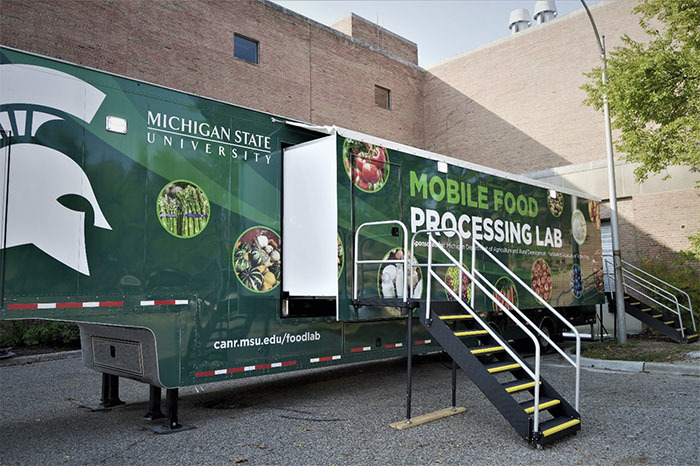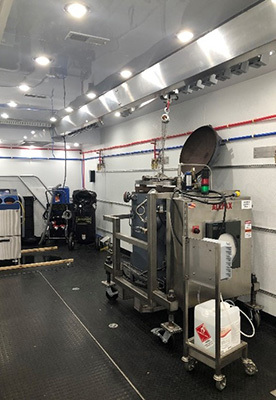MSU’s New Food Lab on Wheels Expands Food Processing Training Opportunities Across Michigan
Nov 19, 2021The tractor trailer based mobile lab replicates the many processes future food production supervisors will manage.
COVINGTON, La., November 19, 2021 — Allpax, a product brand of ProMach, and Michigan State University (MSU) College of Agriculture & Natural Resources jointly engineered a unique retort for a canning line, one of the featured food processing systems on the college’s innovative over-the-road pilot plant. The mobile food processing lab – a 53-foot-long trailer equipped with liquid and solid thermal processing lines – began service Fall 2021.

The mobile food processing lab provides the hands-on training component of the new MSU Institute of Agricultural Technology (IAT) Food Processing, Technology, and Safety Certificate program for training the next generation of food processing plant supervisors in Michigan. Following graduation, students receive a MSU IAT certificate and associate degree from one of the five community colleges offering this program. Graduates will be prepared to safely operate and maintain food processing equipment. They will be able to perform safety checks and product analysis in order to ensure the highest standard of quality and consumer safety.
Program requirements involve earning 60 credits. All students in the program complete an agricultural technology clerkship and industry relevant internship and need to pass courses in facilities management, unit operations, safety principles and regulations, and applied microbiology and chemistry in food processing. Elective courses are offered in processing specific food groups, including cereals, dairy, muscle foods, and fruits and vegetables.
The mobile processing lab expands training opportunities across Michigan and saves considerable capital investment as one unit serves multiple campuses, eliminating the need for each institution to replicate a food processing plant. The State of Michigan provided the grant money for the mobile food processing lab and for renovations to the food processing complex on the campus of MSU. University educators believe the new certificate program provides a blueprint for other states to prepare the next generation of managers in food processing, technology, and safety.
The Need for Trained People to Enter Food Processing
According to the U.S. Bureau of Labor Statistics, there will be about 32,600 openings for food and tobacco processing workers each year, on average, from now through 2030. The Michigan Department of Agriculture and Rural development finds that nearly 40% of the 3,300 food processing facilities and warehouses in Michigan have challenges hiring employees with the skills needed for today’s food processing environment. The IAT Food Processing, Technology, and Safety certificate was developed to meet the need within the state for the next generation of food technologists.
The trailer housing the mobile lab measures 53ʹ x 8ʹ-6" x 13ʹ-6" and includes a 30ʹ x 4ʹ bump-out section that provides space for an analytical laboratory. Pasteurization and canning lines are the center pieces of the unit with all of the auxiliary equipment and utilities found in modern solid and liquid food processing plants, including lye and abrasive peelers, slicer, dicer, steam kettles, labeler, direct and indirect pasteurizer with homogenizer and clean-fill hood, eye wash and drench, water treatment system with on-demand hot water, culinary steam generator, ultrasonic sieve, screw press, hydraulic press, pulper finisher, chiller, cherry pitter, grape destemmer, compressed air, handwashing sinks, and a 48kW, 300A, 3-phase, electrical generator. The interior of the trailer features a food grade processing area equipped with an automatic hand and shoe washing system as well as an analytical laboratory including equipment such as pH meters, water activity meter, texture analyzer, viscometer, colorimeter, refractometers, titration equipment, scales, and UV-Vis system.

Larger pieces of equipment are on wheels and are secured with tie downs using a unique air liner track system during transport. Wheels are also handy for moving the equipment into and out of the trailer for in-plant work and storage.

The mobile lab manager, Dr. William Dixon, along with Dr. Jeffrey Swada, the director of Food Science, oversee all aspects of scheduling and other logistics. Food processed in the trailer will be donated whenever possible to food pantries. The mobile lab will also be made available for training at various food production facilities.
The Space Challenges of Incorporating a Vertical Retort Inside a Trailer
"A canning line was essential to the program and that meant a retort with production capacity for an accurate hands-on learning experience," said Swada. "We did not know how we were going to fit an actual production retort into the trailer and also put it on wheels, which adds height. Furthermore, we wanted the students to have exposure to the type of modern control system, capability for graphical machine interface, and automated valves they will find in a modern food processing plant. There was a lot on our wish list."
Allpax, one of the world’s leading retort manufacturers, is dedicated to furthering shelf-stable food processing education and works closely with two- and four-year educational institutions. In close collaboration with Dr. Swada, the Allpax team engineered and built a rolling height-adjustable cart for a completely refurbished – good as new – used vertical retort designated as a Model 2401. For lab training, the retort cart is rolled into position and the unit is then lowered to rest solidly on the trailer floor. Lowering is necessary to provide the clearance for an overhead winch to raise and lower a retort basket into and out of the unit. With an eight-foot-high ceiling, every extra inch of clearance was needed given that the retort is four feet tall and the basket three and a half.

The vertical unit is a static retort with processing flexibility to sterilize in two different modes: steam and full water immersion. The MSU food processing complex on campus, which was renovated under the same grant as the mobile unit, features an Allpax Model 2402 multi-mode retort. The 2402 can replicate nearly all static and agitation sterilization modes used by industry.
"Without the Allpax commitment to education, which includes design, manufacturing, and educational discounts, reaching this level of technology would have been next to impossible," Swada said.
The Food Processing, Technology and Safety certificate program is available at:
- Michigan State University, East Lansing, in association with Lansing Community College
- Delta College, University Center
- Kellogg Community College, Battle Creek
- Muskegon Community College, Muskegon
- Wayne County Community College District ‒ Downriver, Taylor
For more information on the Food Processing, Technology, and Safety certificate program, visit www.canr.msu.edu/iat/food-processing. Video tour of the mobile lab, https://www.youtube.com/watch?v=aFoVzyjAHeE.
For more information on Allpax solutions for industry and education call 888-893-9277 and visit www.Allpax.com.
About Allpax
Supporting the highest levels of product safety and regulatory compliance, Allpax manufactures processing and sterilization solutions for the food, beverage, pet food, pharmaceutical, and nutraceutical industries, including autoclaves, retort room components, fully automated retort rooms, and product handling equipment that supports retort room automation. Allpax is a product brand of ProMach, a global leader in packaging line solutions. As part of the ProMach Product Handling business line, Allpax helps our packaging customers protect and grow the reputation and trust of their consumers. ProMach is performance, and the proof is in every package. Learn more about Allpax at www.Allpax.com and more about ProMach at ProMachBuilt.com.
Media Contact
David Starck | David.Starck@promachbuilt.com← Back to Press Releases